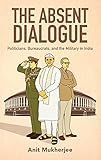The absent dialogue : politicians, bureaucrats, and the military in India / Anit Mukherjee.
By: Mukherjee, Anit [author.] .
.
Material type:  BookPublisher: Oxford Univ. Press New Delhi 2020Description: xvii, 313 pages ; 25 cm.ISBN: 9780190905903.Subject(s): Civil-military relations -- India
BookPublisher: Oxford Univ. Press New Delhi 2020Description: xvii, 313 pages ; 25 cm.ISBN: 9780190905903.Subject(s): Civil-military relations -- India| Item type | Current location | Call number | Status | Date due | Barcode |
|---|---|---|---|---|---|
 Book
Book
|
Indian Institute of Public Administration On Display | N119x54 M896 (Browse shelf) | Available | 89301 |
Browsing Indian Institute of Public Administration Shelves , Shelving location: On Display Close shelf browser

|

|

|

|
No cover image available |

|

|
||
| N11 Mc166 The new rules of war : | N11 T999a The art of war | N119x54 C361 Rooks and knights: civil-military relations in India | N119x54 M896 The absent dialogue : | N11x4 C232 Gender and the military: women in the Armed Forces of Western democracies | N11x54 Ar67 India's national security: vision 2030 | N11x54 R812 India's historic battles: from Alexander the Great to Kargil |
Includes bibliographical references and index.
Introduction: Democratic civilian control -- Forging the sword : civil-military relations and military effectiveness -- Convenient narratives : historical evolution of civil-military relations -- The false promise of self-reliance : the weapons procurement process -- The coordinators : India's unique approach to jointness -- An "in-house" affair : India's system of professional military education -- Simply the best? officer promotion and selection policies -- The best of intentions : defense planning in India -- Tumultuous times : the contemporary discourse on civil-military relations -- Conclusion: Civilian control and military effectiveness.
"Civilian control over the military is widely hailed as among the biggest successes of India's democracy. This is a rarity, especially among post-colonial states, and is rightfully celebrated. But has this come at a cost? In The Absent Dialogue, Anit Mukherjee argues that the pattern of civil-military relations in India has hampered its military effectiveness. Indian politicians and bureaucrats have long been content with the formal and ritualistic exercise of civilian control, while the military continues to operate in institutional silos, with little substantive engagement between the two. In making this claim, the book closely examines the variables most closely associated with military effectiveness -- weapons procurement, jointness (the ability of separate military services to operate together), officer education, promotion policies, and defense planning. India's pattern of civil-military relations -- best characterized as an absent dialogue -- adversely affects each of these processes. Theoretically, the book adopts the 'unequal dialogue' framework proposed by Eliot Cohen but also argues that, under some conditions, patterns of civil-military relations maybe more closely resemble an 'absent dialogue.' Informed by more than a hundred and fifty interviews and recently available archival material, the book represents a deep dive into understanding the power and the limitations of the Indian military. It sheds new light on India's military history and is essential reading for understanding contemporary civil-military relations and recurring problems therein. While the book focuses on India, it also highlights the importance of civilian expertise and institutional design in enhancing civilian control and military effectiveness in other democracies"--


There are no comments for this item.